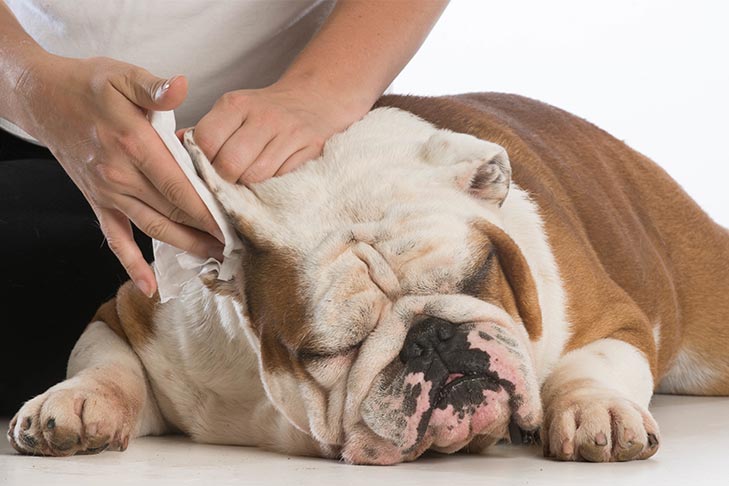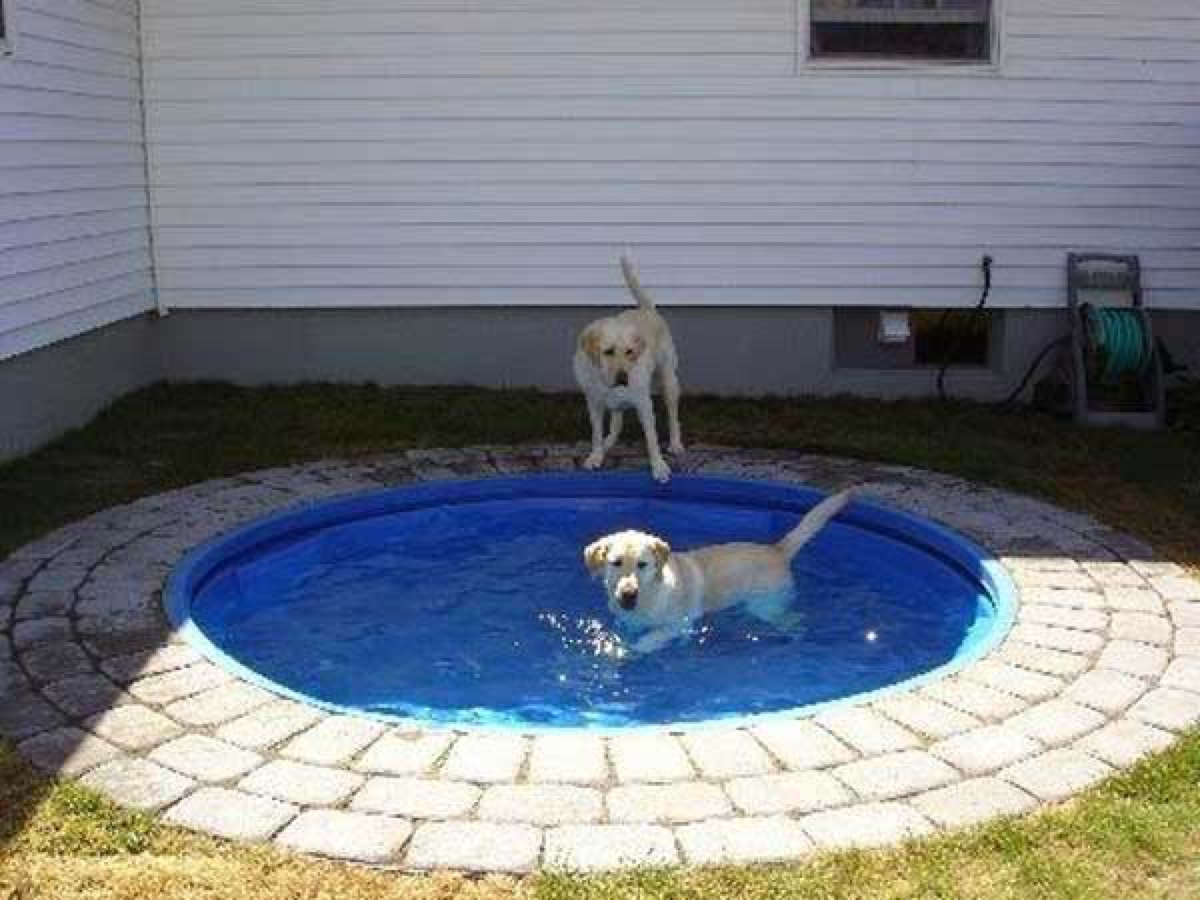Connect with a verified veterinarian in minutes. Licensed vets are available 24/7 to answer your questions. No need to worry about your furry family member.
Dirty ears and ear infections are common problems for most dogs—and just like us, our fur babies don’t generally like to have their ears examined and treated or cleaned. However, checking your pet’s ears is a good way to make sure your pup stays healthy.
In this article, we’re going to look at what causes dog ear excess wax, irritation and infections, the signs & symptoms of ear problems in dogs and how to clean your dog’s ears. We’ll even share a homemade dog ear cleaner recipe or two (or more). First, let’s take a look at what causes ear problems in our canine companions.
Ear Problems in Dogs
Just what causes ear problems in our dogs? Some of the most notable culprits and causes of dog ear infections are:
- Ear mites (parasites–insects!)
- Moisture (most often water)
- Bacteria
- Yeast
- Too much hair (in and around the ear)
- Allergies
- Other medical conditions (hormone imbalances, hypothyroidism)
That’s quite a yucky list of ear problems in dogs! Did you know that a dog’s ear canal is also part of the problem? We humans have a more horizontal ear canal, which helps keep dirt and moisture in the ear canal, rather than reaching the inner ear. However, dogs have a vertical ear canal; this means dirt and moisture can easily flow into your pup’s ears and reach the inner ear, where infections and other problems can start.
Not only that, but a dog’s ear canals contain twists and turns, creating small environments where bacteria, yeast and parasites can land and begin to grow. Your pup’s twisty ear canal also makes it harder for him to get dirt and other debris out of his ears.
It’s necessary to also discuss ear mites—tiny parasites that live in the ears of most dogs. Ear mites are tiny (as in almost microscopic) insects—yes, you read that right. These tiny insects love to live in your pup’s twisty ear canals. Ear mites dine on the oils and wax produced in your dog’s ears. Yuck! Mites can cause irritation, inflammation and even pain if left untreated. You may suspect your fur baby has ear mites if you notice a dark discharge from his ears—this discharge may resemble fine coffee grounds.
Dogs can develop ear infections due to ear mites—infections that can quickly become quite serious if left untreated.
Some dog breeds are more prone to ear infections than others, including:
- Labrador Retrievers: they love water, which can become trapped in the ear—yeast and bacteria love wet environments. Also included here: Golden Retrievers, Chesapeake Bay Retrievers, Portuguese Water Dogs—most any dog that loves water, too!
- Pit Bulls: these dogs tend to have ear problems most often caused by allergies.
- Shar-Peis: their skin folds tend to trap dirt and cause narrower ear canals.
- Poodles: have hairy ears—the excessive hair can trap dirt and debris in the ears. Also in this category: Shih Tzus, Schnauzers, Maltese, Bichon Friese, and Lhasa Apsos.
- Setters: including Irish & English Setters, have long, hair ears and love water.
- Cocker Spaniels: heave floppy, heavy ears and excessive hair near the ears. Include here Basset Hounds, Beagles, Bloodhounds, Afghan Hounds, Foxhounds, Coonhounds and Dachshunds, Springer Spaniels, Cavalier Charles Spaniels—all have similar heavy, floppy ear.
It’s important to note that a dog of any breed or mixed breed can be prone to ear irritation and infections. This is especially true for dogs that have allergies. This is because allergies can cause irritation, making your pup’s ears itchy and irritated. This leads him to scratch, which can then lead to an ear infection. Allergies can also make your pup more prone to yeast and bacteria. Some allergic dogs have frequent ear infections. The only way to ease this problem is by treating any allergies your dog may have.
Signs & Symptoms of Ear Problems in Dogs
Dogs that have an ear irritation or infection are pretty hard to miss. You’ll notice some of these signs and symptoms if he’s having ear problems:
- Redness
- Swelling
- Irritation
- Discharge—dog liquid ear wax (may be brown, black or even reddish; may resemble coffee grounds)
- Scabs and/or crusty skin (in and around your pup’s ears)
- Strong (bad) ear odor
- Hair loss (near the ear)
- Scratching
- Head tilting
- Rubbing ear (on anything he can use to stop the itching)
- Head shaking
- Hearing loss
- Loss of balance
- Walking or stumbling (typically in circles)
- Eye movements (whatever is unusual for your dog)
This is quite a long list of signs and symptoms; however, the most common symptoms are redness, discharge, irritation (skin in and around the ear). If your dog has started tilting his head, head shaking, etc. this is a sign of a deeper ear problem.
First-time doggie parents may have trouble spotting their pup’s first infection. If your dog shows any of these signs and/or symptoms, it’s time to take him to the vet. You want to avoid the problem becoming more serious and catch the infection as soon as possible. Early treatment will keep your fur baby from developing a more serious condition or infection. Plus, your vet may even suggest preventive ear cleaning if he suspects your pup may be prone to ear problems.

Review symptoms, medications & behavior to keep your pets healthy with a Vet Online in just minutes.
Ask a Vet Live NowPreventive Ear Cleaning for Your Dog
Your pup may have developed an ear infection—this is a common condition and it can happen. If your vet’s diagnosed an infection, they’ll give directions on how to treat it. Your dog may need to be treated with prescription medications, as directed by your vet.
In addition, your vet may suggest preventive ear cleaning for your fur baby, which may also include a DIY dog ear cleaner or a commercial ear cleaning product.
Preventive cleaning is done on a regular basis. Some dogs may only need their ears cleaned once a month, while others will require weekly maintenance. If your canine companion is prone to ear infections on a regular basis, then it might be necessary to clean his ears on a weekly basis. Your vet will be the best one to advise you on how often to clean your dog’s ears. The vet will also most likely give you some advice on how to clean your fur baby’s ears.
The ear cleaning process will involve cleaning the ears with cotton swabs and a mild cleaning solution. This will remove the buildup of dirt and grime that is present in your dog’s ears. The ear cleaning solution will also help to keep your dog’s ears healthy and prevent infection from occurring.
The base of the ear will be cleaned first, followed by the outer ear and then the inner ear. The process may take a few minutes to complete. Dog ear wash should be done at least once a week to keep your dog’s ears clean and healthy. Q-tips are used to clean the ear canal, while cotton swabs are used to clean the eardrum.
Foreign objects in the ears can be very painful for your dog. The buildup of dirt and grime in the ears can cause infection, leading to pain and discomfort. Cleaning your dog’s ears with a cotton swab or an ear drop is an effective way to remove any debris that may be causing problems.
Irritated ears can also be painful and make your dog uncomfortable. Using a mild ear cleaning solution can help to ease the pain. It’s important to keep your dog’s ears clean and healthy, so they don’t develop infections or develop a chronic condition that may require antibiotics.
A home remedy for dog ear cleaning can be made with vinegar and water. Mix equal parts of vinegar and water in a bowl. Gently clean your dog’s ears with the solution. It’s important to make sure that you don’t get any of the solution into your dog’s eyes, as this can cause irritation. Keep your dog’s ears dry after cleaning them, as this will help to prevent infection from occurring.
Here are the most common steps to clean a dog’s ears (weekly, monthly, or as often as recommended by your vet):
1. Wash your hands before touching your dog’s ears, the cleaning solution and the cotton balls. You want to avoid introducing allergens, infections, etc. into your dog’s ears.
2. Moisten a cotton ball with ear cleaning solution.
3. Gently rub the cotton ball over the outer areas of your dog’s ear to remove any dirt or debris you can see. Be very gentle with your fur baby’s sensitive ears. Use a clean cotton ball for each ear, to avoid spreading infection to your pup’s other ear.
4. Moisten a new cotton ball and gently place the cotton ball into your pup’s ear.
5. Gently massage your dog’s ear with the cotton ball inside. Your dog’s outer ear may not be long enough to fold over. If this is the case, just use your hand to gently hold the cotton ball in the ear and massage it around the inside ear. Do not push the cotton ball (or ear swabs) into your dog’s ear canal, as this could cause damage to his inner ear. When you’ve finished one ear, then moisten a clean cotton ball with the ear cleaning solution and repeat this step in your dog’s other ear.
6. When you’re finished, your fur baby will more than likely shake his head. This is good! The shaking will loosen any dirt and debris and help it come out as your pup shakes his head.
7. Reward your pup for his good behavior.
8. Wash your hands when finished to avoid spreading the infection to your pup, other pets and even yourself and family.
Never apply the ear cleaning solution directly onto or into your fur baby’s ears, unless directed to do so by the vet. Put the solution onto a clean cotton ball each time and be sure to use only clean cotton balls for each of your pup’s ears.
Avoid cleaning your dog’s ears too often; over-cleaning can actually upset the delicate environment in his ears and can lead to infections or other problems. Cleaning once a week should be enough, unless your vet gives directions to clean your dog’s ears more often. We’ve taken a look at ear infections in dogs, signs & symptoms and how to clean your dog’s ears. Now we’ll look at some ear cleaning solutions you can make at home.
Homemade Dog Ear Cleaning Solutions
There are some dog ear cleaners you can make at home! They’re natural and quite safe when used as directed. You may want to buy a small squeeze bottle to store the solution in between cleanings. Here are some easy, inexpensive recipes for dog ear cleaners! The best dog ear cleaner is the one recommended by your vet—they may recommend one of these natural recipes:
- Vinegar & Water: use a solution of ½ vinegar and ½ water; shake to combine and then apply as directed by the vet or apply to clean cotton balls. You can either use regular white vinegar or apple cider vinegar—both are safe for your fur baby.
- Witch hazel dog ear cleaner recipe: mix ½ witch hazel and white or apple cider vinegar. Shake to combine and then apply to your dog’s ears as directed by the vet or using the cotton ball method. Witch hazel can also be used alone, if you prefer.
These are the safest options when it comes to your fur baby’s sensitive ears. You should avoid homemade ear cleaning solutions that use rubbing alcohol and/or hydrogen peroxide. These substances can be harsh, even causing irritation and inflammation that can lead to infections. Only use these ingredients if directed by your vet.
When Not to Clean a Dog’s Ears at Home
Certain instances indicate it’s not good to clean your dog’s ears at home. Here’s a quick list of signs; if your dog shows any of these symptoms, it’s best to call the vet and have your dog’s ears checked:
- Head shaking/scratching
- Head tilt or holding the ear down
- Ear odor that’s new and/or very smelly
- Redness or swelling around the ear opening
If your dog has any of these symptoms, he probably has an ear infection or a foreign object (such as grass seed) in his ear. These problems need to be treated by a vet. Once these issues have been resolved, ask your vet if cleaning your dog’s ears at home would be helpful. Be sure to ask about the type of cleaning solution that’s best for your dog’s ears.
Ear Cleaning Can Make Ear Problems Worse
If your fur baby has an ear infection, there may be no outward symptoms other than scratching his ears or shaking his head. In that case, cleaning your dog’s ears could worsen the infection.
Another common problem with ear cleaning is that if your dog’s ear is sore, using an OTC ear cleaning product may cause a lot of pain. Most of these products are made to treat yeast infections and can be very painful if applied to raw sores.
Finally, ear cleaning can be harmful if your dog’s eardrum has ruptured. Using a cleaning solution, even a DIY ear cleaning solution, can lead to nerve damage. If bacteria are pushed further into the air, they could enter your fur baby’s middle ear, leading to balance problems.
We hope this article helps you to better understand your dog’s ears! If you have any questions, be sure to check with your vet! We wish your fur baby years of healthy ears!
Connect with a verified veterinarian in minutes. Licensed vets are available 24/7 to answer your questions. No need to worry about your furry family member.

Julie
Julie is a graduate of the University of North Carolina, Wilmington, where she studied Animal science. Though contrary to the opinion of her parents she was meant to study pharmacy, but she was in love with animals especially cats. Julie currently works in an animal research institute (NGO) in California and loves spending quality time with her little cat. She has the passion for making research about animals, how they survive, their way of life among others and publishes it. Julie is also happily married with two kids.
Review symptoms, medications & behavior to keep your pets healthy with a Vet Online in just minutes.
Ask a Vet Live Now




